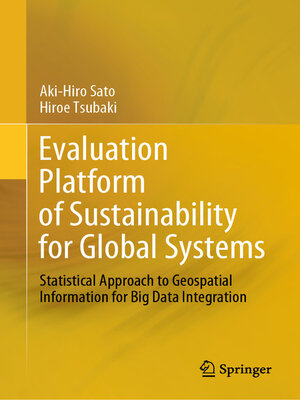Evaluation Platform of Sustainability for Global Systems
ebook ∣ Statistical Approach to Geospatial Information for Big Data Integration
By Aki-Hiro Sato

Sign up to save your library
With an OverDrive account, you can save your favorite libraries for at-a-glance information about availability. Find out more about OverDrive accounts.
Find this title in Libby, the library reading app by OverDrive.



Search for a digital library with this title
Title found at these libraries:
| Loading... |
The authors of this book assert that Grid Square statistics, a method of aggregating data within a geographically defined Grid, may be an effective solution to approach geospatial data for big data integration. Grid Square statistics is a technique that allows us to collect and analyze data based on Grids and makes it easier to understand patterns and trends. Sustainability, a key concern for the future of our society, often involves balancing multiple independent objectives. These objectives and key performance indicators must be shared to solve multi-dimensional optimization problems with some constraints related to sustainability issues. However, many of these sustainability issues are challenges that are part of global systems, which are modeled as a complex system consisting of many components. Social, economic, and environmental aspects in our socio-economic systems require solutions designed for the sustainability of our society.
These conditions imply that Big Data must contribute to evaluating our current situation, actions, and changes to continuously change our behavior and society based on a Plan-Do-Check-Action (PDCA) cycle. The PDCA cycle, also known as the Deming cycle, is a four-step management method used to improve processes and products continuously. We must understand how to construct a platform by using Big Data to do so. Thus, extracting meaningful information from Big Data is crucially important in the advanced information society.
This book provides case studies based on Grid Square statistics. It shows their applications to socio-economic and environmental problems such as tourism, where we analyze visitor patterns to optimize resource allocation, SDGs indicator, where we monitor the sustainability of our socio-economic systems, and disaster management, where we face natural disaster to enhance preparedness. Finally, the book proposes a World Grid Square Statistics Reference Architecture for constructing data applications across organizations and domains and reports on design concepts, system architecture, and the implication of a data platform for World Grid Square data and statistics.






